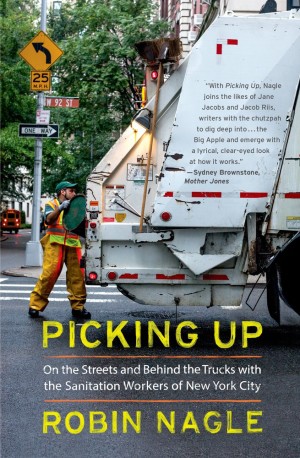It takes many very important systems to make cities run. But of all of them, what system does anthropologist Robin Nagle say is the most important labor force in service to cities? Those who pick up our trash.
In her book, Picking Up: On the Streets and Behind the Trucks with the Sanitation Workers of New York City author Robin Nagle helps us learn why this is the case – in spades. But Nagle goes deeper; she delves into why the “first line of defense in any city’s ability to ensure the basic health and well-being of its citizenry is so unseen,” and why people want it this way. She asks, how can sanitation workers play such a critical role in a city’s well-being but people treat them “as if they cease to exist?”
Picking Up takes on a provocative question: “Why should we care about sanitation people?” For starters, no city can “thrive without a workable solid waste management plan.” If sanitation workers aren’t there, this one thing is true: A “city becomes unlivable, fast.” While her exploration is particular to New York’s sanitation department, the narrative applies to your city, my city, and cities around the world. Nagle gives us full-frontal understanding of what it would be like if this workforce was not on our streets every day, and why they “don’t get the kudos they deserve.”

Robin Nagle
She started her research by accompanying sanitation workers, and it eventually inspired her to become one. Yes, she trained and actually became a sanitation worker to see what it was really like. But before we ride with her on the job, Nagle goes into a fascinating – and filthy – history of how sanitation developed in cities.
Not only do we get an insider’s look at how city sanitation systems really work, we learn what happens when they don’t work – like the infamous NYC blizzard of 1888 or the Christmas blizzard of 2010– when the sanitation system came up short and the repercussions were “ruinous.”
You might also not believe it until you read this book, but when you do, you’ll see how just how the Bureau of Labor Statistics in 2012 deemed sanitation work the “4th most dangerous job in the nation.” Nagle also takes us inside the unique sanitation worker culture, from those who like to “mongo,” to “the complex kinships, arcane rules, and obscure lingo.”
What a colleague told Nagle one cold morning succinctly sums it up: “If you’re lucky, you can go your whole life without ever having to call a cop. And you can go your whole life without ever calling a fireman. But you need a sanitation worker every single day.”
Picking Up brings home how we need to appreciate our sanitation system and all of those who work for it, because they play a critical role in making our communities, cities and the world work.
As part of the LiveTrue Book collection, here’s to living true when it comes to those who mind our trash: the next time you see the sanitation workers who are taking away your trash, look them in the eye and say, “Thank You.”

